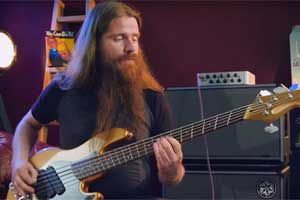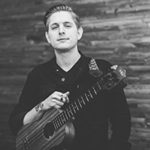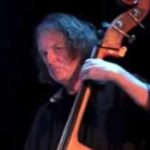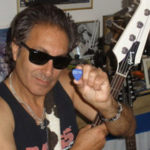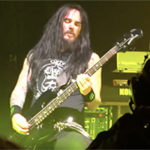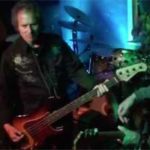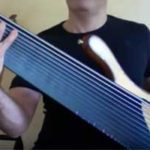Dutch rocker recounts his climb up the rock & roll ladder, plus info on bass technique, equipment arsenal and landing the Epica gig!
Exclusive interview with FBPO’s Jon Liebman
April 11, 2016
A native of the Netherlands, Rob van der Loo is best known as the bass player for symphonic metal band Epica and gothic rock band Delain.
FBPO: Having grown up in the Netherlands, how would you describe your initial exposure to music?
Rob: My parents are both big music fans. My father used to play drums in a band, sometime in the ‘70s. He was a big Led Zeppelin fan, so there you go. I was really raised with music like Cream, Led Zeppelin, Deep Purple, Black Sabbath, you name it.
FBPO: That sounds like a cool way to grow up!
Rob: Yeah. My parents always stimulated my brother and me to make music. I was 8 years old when I started playing saxophone. I went to music school, but it was quite boring. The only thing I learned to do over there was learn to read from a “G” key and that was about it.
FBPO: Were you listening to sax players like Charlie Parker or John Coltrane or David Sanborn…?
Rob: Oh yeah, sure! My parents were also listening to jazz. As a child, I always liked the looks of the saxophone. I liked the sound of it, so my parents said, “If you ever want to play an instrument, what would it be?” And I said, “Well, the saxophone sounds cool and it looks cool. Let’s go for it!” At that age, I didn’t even know what a bass guitar actually was! [Laughs]
FBPO: Did you want to be a jazz player, or maybe an R&B player on the sax?
Rob: That was back in the ‘80s, when Candy Dulfer and Hans Dulfer were quite popular. They’re from Holland as well. They were quite an example for me. So that’s how that part started. Later on, when I was 12 years old, my hair started to grow, I really got into the heavy rock thing a little bit more and that’s when I got into bass guitar.
FBPO: If you wanted to get into the heavy rock thing, is it kind of an unusual leap to go straight to the bass? Most guys want to be guitar players.
Rob: Yeah, exactly. My brother actually got himself a cheap Italian guitar from one of his teachers and I really liked it. But everybody wanted to play guitar. There was a guy in our neighborhood who actually had a bass guitar. I never knew what a bass guitar was until I saw that one and I said, “Wow! This thing is huge!” And I really loved the sound, you know, the low end and the fact that it was so huge, compared to the electric guitar. I really liked the power of it and that’s kind of how I got into it. I mean, everybody played guitar back in those days. Bass guitar? “Well, we need a bass player in the band, so go ahead. Play bass.” There you go.
FBPO: Not an uncommon story.
Rob: No.
FBPO: So about how old were you at the time?
Rob: I was 12 when I wanted to play bass, but my parents got a little bit pissed off because I didn’t do anything with the saxophone any more. They said, “First, go sell your saxophone and if you want a bass guitar, then save money for it and buy one yourself.” By then I was, I think, 13 or 14 years old.
FBPO: Did you start to listen to music differently, once you discovered the bass?
Rob: Oh yeah. Definitely.
FBPO: Who were some of your early bass influences?
Rob: I have to admit that, like I said, Led Zeppelin, Black Sabbath, Deep Purple. You know, Geezer Butler, John Paul Jones. They’re still my examples. That’s kind of how it started for me. And I remember back in those days Metallica was big; they had just released The Black Album. I was really into Cliff Burton. And Jason Newsted. I would say he’s a very underrated bass guitarist. I was also really into Billy Gould from Faith No More. I was listening to a lot of grunge bands, mostly bands like Alice in Chains and Soundgarden. That’s the type of bass guitar I really liked. You know, heavy rock.
 FBPO: Were you in the music programs in school while you were growing up?
FBPO: Were you in the music programs in school while you were growing up?
Rob: Yeah, I played bass in the school bands.
FBPO: Did you ever play upright?
Rob: No. They had an upright bass and I tried it, but oh man, I really hurt my fingers back in the days! [Laughs] It was a little too big, so I thought no. Besides, bass guitar, they had a big amp over there, a big Randall, and I said, “No, this goes way louder! I’ll go for that.”
FBPO: What kind of a music school experience did you have?
Rob: First, it started as a hobby, of course. I never had in mind to become a professional musician, to be honest. I thought it was impossible to become a professional rock musician, especially back in those days. And there weren’t a lot of international Dutch bands anyway and I’m from Holland, so I thought if I want to make it big, I have to go, maybe to the states or something. I was really into that. But then later, I started playing in a band called Sun Caged and we started to play international shows as well and things got a little bit more interesting from that point. But I was already 20 years old. That’s when I really got my ambitions to become a professional musician.
FBPO: Were you a music major from the beginning?
Rob: No. First I studied chemistry in Eindhoven, in a technical university, but I never got my degree for that because also I was pretty ill at the time. I had – and still have – a pretty severe form of epilepsy. I’m doing fine now, though. I’ve been stable for like eleven years already. But back in those days it was really bad and they advised me not to work in laboratories again because it was too dangerous for me.
So at the time it was like, “Okay, what am I going to do now?” I was already playing in bands, so my parents said, “Just go to a conservatory or a public academy or something so you can focus on something that you really want to do, what you really like to do and we’ll see how it works out.” And that is when I went to the rock academy in Tilburg. That’s where I got my bachelor of music for bass guitar.
FBPO: How did your career get rolling? What were you doing initially?
Rob: Well, of course, it’s quite a big step to go to a rock academy, for instance. You have to push away everything. I stopped working and I completely focused on music. The good thing about a school like that is they have a big network. So from year one, they already want you to go start teaching, or they would like you to audition for certain showcases, so you kind of roll into it. It’s one big network. That’s the good thing about a school like that. From year one, I already started doing workshops or master classes. I started teaching. And that’s how it started for me.
During the second year of that school, I got to join Delain, which is still going on right now, and that’s when I started touring internationally. I got into that band when I was in the second year of that school and they were already signed by Roadrunner Records. It went so fast. I mean after six months we were already doing international tours, touring through Europe and everything and I was still in college. It was kind of a snowball effect.
FBPO: How did the Epica gig come about?
Rob: Well, they called me! [Laughs]. I played in Delain for a while, like four years, and we were touring and touring and touring, but it wasn’t really paying the bills. That’s also the main reason I quit. I had just finished school and I had to get income, of course, so I said, “Okay, I can’t do this band thing any more and I had to just focus on music education. I needed a steady form of income.
I got in touch with Mark Jansen, who’s sort of the bandleader of Epica. I’d known him for quite some years because he was actually born in the same region where I’m from. One day they decided to part ways with their former bass player. Epica is actually a band that had been touring full-time for ten years already, so they were already quite stable. So they said, “Okay, we got a job for you. You want to join?” And I said, “Sure. Why not?” [Laughs]
FBPO: So you were the new kid for a while. How was that transition? How did you get accustomed to becoming a full-fledged member of the band?
Rob: I tell you, it went pretty quickly, to be honest. They never gave me the feeling that I was the new guy. I got into the band and it was like:
- “Okay, when is my first show?”
- “In three weeks.”
- “Okay, in three weeks. Tell me something about the music. What do I have to study?”
- “Oh, just study our five albums and you’ll be fine.”
- “Three weeks for five albums?”
- “Yeah, three weeks for five albums ‘cause we don’t know the set list already, so just do it.”
Okay, so I really busted my ass to study all those albums and before the first show, I said, “When are we going to do a rehearsal?” And they said, “Oh, you’ll be fine. Don’t worry.”
- “So we’re not going to do a rehearsal at all?”
- “No, we’ll just pick a few titles and we’ll do them during sound check maybe and we’ll just do the show. Don’t worry.”
And that’s how it went. And since then, I’ve done maybe four years. It was pretty crazy.
FBPO: Tell me about your bass technique. Do you play much with a pick or do you play more with your fingers?
Rob: Actually, I’m more of a finger-style bass player, but Epica needs the guitar pick sound. The former bass player, Yves Huts, did everything with a guitar pick and it really became a part of their sound. They really need a pretty punchy bass sound. They said, “Okay, if you want to do a finger-style, whatever, that’s up to you, but I want to keep the sound authentic, of course. I still want to keep the original sound into it.”
It’s not that I’m really copying the former bass player, but I didn’t want to change anything, of course, and that’s why I started picking up that technique as well. I kind of do it 50/50. Some songs I play finger-style; some songs I do with a guitar pick. When we’re in the studio, if I want a real clear bass tone, I always go for the guitar pick.
FBPO: Tell me about your equipment, particularly your Dingwall basses.
Rob: My setup is very simple. I don’t play with a bass amp any more on stage. A lot of bass players are probably shocked to hear that, but we play orchestral metal music.
FBPO: In some ways, your band reminds me of the Trans-Siberian Orchestra. Would you say that’s a fair comparison?
Rob: That’s actually quite a compliment. Yeah, I can imagine that because they also work with a big orchestra. On stage, sometimes, we work with backing tracks because it’s impossible to bring an orchestra to every show. The thing is the music is very full. There are a lot of details in it. We play with full orchestra and there are a lot of heavy guitars in it, so you have to have a real clean bass tone on stage. The more noise you have on stage, the harder it will get for the front-of-house engineer to get a clear tone. That’s why we decided, “Okay, let’s try everything with ear monitoring and just work with DIs or pre-amps and just check it out. For the past few years, I’ve been working with just a clean Radial DI and Darkglass B7K overdrive system. And that’s it, basically. So simple, yet so effective.
FBPO: Do you have one or two “go-to” basses, your Dingwalls, or do you have a big arsenal of instruments?
Rob: Well, I’ve got a big arsenal, but right now, I always bring my two Dingwall basses. I have a five-string “Super P” bass, a combination of a Precision bass with a Jazz bass pickup. It has a maple fretboard. It’s an awesome bass! I also have a five-string Jazz bass, made by Dingwall. That one has three pickups on it. I kind of switch between those two basses during a show because they’re both really awesome! They have quite a similar sound.
FBPO: So, out of all the basses you could play, why Dingwall?
Rob: I’ve known (about) Dingwall since, I guess somewhere in the ‘90s. I remember going to this huge music store where they had two Dingwall basses. I don’t remember the exact types. I had never tested them because I always got seasick looking at their fanned frets. It was like, “No, that’s never going to work for me. That must be unplayable.”
But a few years ago, I got in touch with a guy from a local rock band called My Favorite Star and this bass player also had a four-string Dingwall Jazz bass and I was really blown away by his sounds! I think he was tuned in C standard and he had such a transparent and growly, awesome sound, which was so clear to hear through the whole mix. And he said, “Do you want to test it?” and I said, “Of course!” and I was in love right away.
The intonation on those basses is incredible. That’s such an important part in a band like Epica because, like I said, we play with an orchestra and a lot of synthesizers. It’s one of the most important factors in your bass sound. Intonation is so important and that’s the whole thing about these Dingwall basses. They have an amazing B string. The sound cuts through so perfectly and the intonation is awesome on these guitars.
FBPO: If the bass is out of tune, the whole band’s out of tune.
Rob: There you go! [Laughs]
FBPO: In addition to the way it sounds, how did it feel when you first picked one up? It’s a little different than your conventional bass, isn’t it?
Rob: No, actually not. To be honest, it feels pretty natural. I was fairly surprised at how natural it felt. That’s what Sheldon (Dingwall) also told me. He said, “When you pick up a bass with the fanned frets, don’t look at it. Just play!” And that’s the whole thing. I mean when you see one hanging on the wall, of course, you say, “Nah, it’s gotta be impossible to play,” but it’s actually quite natural.
Sheldon has been working on a new bass too. I’ve always been forced to play on a five-string. With a band like Epica we always play in B standard. I actually always had a dream to switch back to a four-string, which is totally focused on low tunings, get my point? I used a lot of four-strings in the past, but I always had problems with intonation. It’s always a problem to get them in tune to sound properly for it, so I’m always kind of forced to use a five-string.
I had a conversation with Sheldon and I said I’m sure there are a lot of bass players out there, especially in the heavy rock scene, that would like to have a four-string bass specially made for low tunings. Are you in to that? I said I actually have this idea to make a Dingwall version of the Thunderbird bass. It would be cool to actually combine those concepts in a project. We had a lot of conversations about that and recently he made a prototype of what has already been baptized as the “Dingbird” bass, which is a four-string bass, based on the setup of my five-string jazz bass from Dingwall in the shape of a Gibson Thunderbird. And that’s the one I’ll be using for the next round and for the next album as well, and for the next tour.
FBPO: Just curious: When you do have to use an amp, what kind of amp do you use?
Rob: I use an Ampeg SVT-VR.
FBPO: Ooh, classic!
Rob: Yeah!
FBPO: What about strings?
Rob: I use Ernie Ball “Power Slinkys.”
FBPO: What about effects?
Rob: Well, I like effects, but I don’t really need any for this band. Less is more, right? I’ll use an overdrive from Darkglass and maybe a SansAmp here and there and that’s about it.
FBPO: What’s keeping you busy these days, Rob?
Rob: Well, we just came back from a tour of Australia and Asia and we’re working on a new Epica album. I recorded my bass parts back in February. Next month, they’re going to record vocals for it. I guess the guitar line for the master is somewhere in June, so the album should be released in September. For this summer, we’ll be doing mostly festivals to round out this album cycle, then the new album comes out and the whole world tour starts all over again.
FBPO: Do you have a title for the record yet?
Rob: No, we don’t have a title yet. We’re still working on that. [Laughs]
FBPO: How about the future? What else would you like to do that you haven’t already accomplished?
Rob: I still want to focus a little bit more on music production. Something else I want to do is to make music for computer games. I was in China recently and had an opportunity to write some music for a very awesome computer game. I also did some sessions for other (computer game) companies and I hope to do more of that. I don’t want to keep focusing on just metal music. I also want to do blues or whatever and keep broadening my horizons.
FBPO: What would you be if you weren’t a bass player?
Rob: That’s a good question. Like I said, I studied chemistry before, but I don’t know if I would be happy doing something like that. The only other thing I could see is becoming a cook. But without music, I wouldn’t be around.
